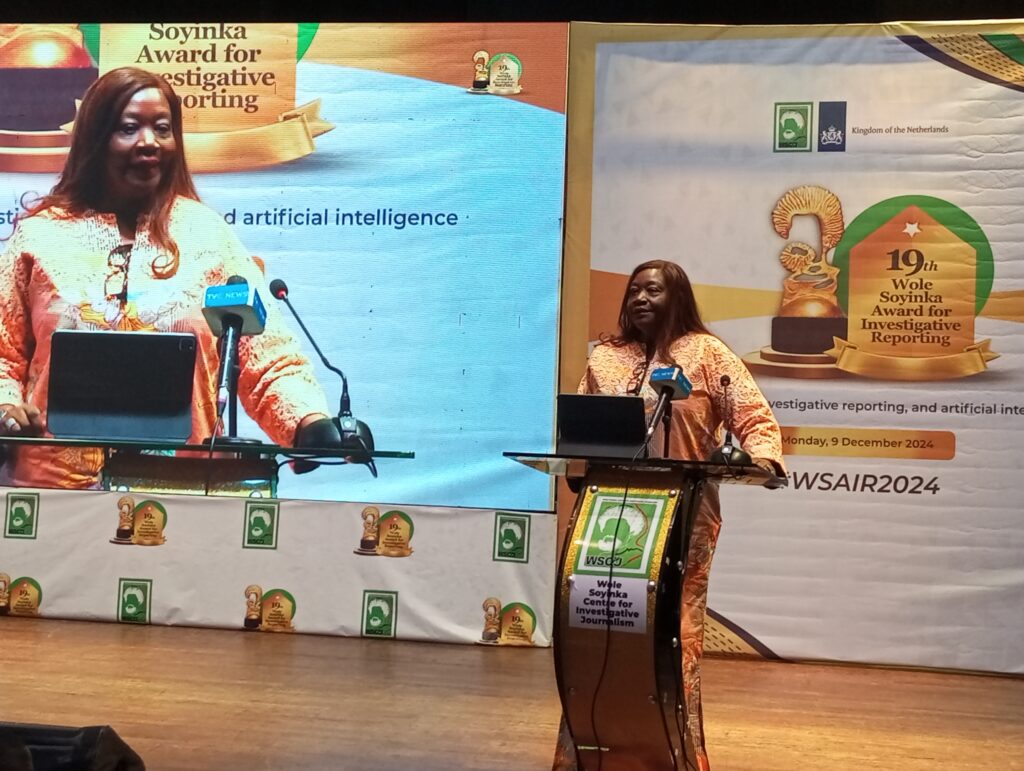Chair of the Panel of Judges for the 19th Wole Soyinka Award for Investigative Reporting (2024 WSAIR), Mrs Stella Din-Jacob, Director of News and Editor-In-Chief of TVC News has suggested how to improve investigative reporting in the country due to decline in the quality of entries submitted for the award.
One of the categories for the award had no winner and there was no overall Investigative Reporter of the Year.
She offered the suggestions in her speech at the award night on Monday while noting that many of the submitted entries did not provide what the judges of the investigative journalism award were looking out for.
Many reports he said were feature stories misconstrued as investigative stories while some even lacked the basic requirement of investigation.
While calling on female journalists to step up their efforts, the newsroom leader encouraged journalists to continue to push the boundaries of investigation and storytelling while advocating for more training by media organisations and mentorship by journalism veterans.
[READ ALSO: 2024 Wole Soyinka Award for Investigative Reporting winners]
READ THE FULL SPEECH BELOW:
As chair of the judging panel for the 19th edition, I am honoured to have worked with a team of esteemed colleagues whose expertise and commitment are highly regarded.
They gave up their time so freely and willingly in evaluating 111 entries, some of them outstanding while some fell short of what the award category stipulated. This year, the centre received a total of 219 entries from 153 journalists. 45 of them were females representing 29.4%. 108 came from male journalists, representing 70.5%. In total 191 entries were sent to the screening committee and this was narrowed down to 111 which came to the judges.
In the course of this year’s exercise, many entries did not make the cut for a few reasons, some basically lack the most obvious element, investigation. Some of the entries showed a disconnect between the journalist on the field who was telling the story and how much of themselves they put into investigating that story to ensure that there was a connection with anyone who was either watching it or reading it. Other entries were feature stories that had all of the elements but were inappropriate for this category of award.
As we gather here again tonight to celebrate the best of the best in media excellence. We’re again faced with several issues that must be addressed.
Today’s world of artificial intelligence has demonstrated its disruptive tendencies. It has put us all on our toes to improve standards and to think of creativity and depth in all we do.
The flip and downside of this is the manipulation of AI in ways that may torpedo the reality of any situation. Today, anyone with a camera and a microphone is a journalist, whether we like it or not.
We also have fake news to contend with, yellow and gutter journalism sometimes, and underhanded tactics to deal with. And I dare say that there is a growing and dangerous subculture of unprofessionalism which is slowly but gradually destroying the letter and the spirit of the ethics of our profession.
Let me come back to the number of entries from female journalists. This center is heavily invested in gender mainstreaming and ensuring that every newsroom includes in its lineup those issues that promote gender inclusivity, and sociocultural and sociopolitical aspects of our daily lives. And it is important that we keep these issues in our consciousness.
Ladies, it is in your hands, be intentional about telling our stories, make them the headlines in everyone’s mindset and stay on those stories that need your time and exposure to ensure that the voices of the voiceless are heard.
Next year, the Beijing Conference will be celebrating three decades since that movement began, my admonition again to female practitioners in the field of journalism is to keep the fire on this remarkable movement on the front line.
It is for this reason that the number of female entries must increase next year.
Our judging panel agreed on a number of issues that must be addressed including the quality of reporting entries that were submitted for this category of award on more occasions than not resulted in us having fierce debates about what we needed to see in the story, the ingenuity of it, the creative ways in which those stories were put together and how much risk were taken. In a lot of those stories that was not evident.
Without a doubt, that said, every media organization must now begin to think about committing to training and exposing its staff to best practices just as veterans in the industry must continue to mentor because, in the final analysis, the ethics of that profession must be upheld.
The winners without a doubt gave it their best shot. More work still needs to be done to improve investigative reporting.
Also, the use of data and the ability to analyze and gather information as journalists go undercover in the state of the story.
We must continue to encourage journalists to push the boundaries of storytelling.
We must guide them as they investigate critical issues to stay above board and hopefully inspire us with their dedication to truth and excellence.
And to our winners, tonight, on behalf of the judges and the centre accept my warmest congratulations.
Your work has made a significant impact and we are proud to recognize your achievements tonight. The quality of reporting, whether investigative or feature must continue to improve.
Let’s never forget that as a journalist, you are only as good as your last performance or you’re only as good as the last piece that you’ve written.
[READ ALSO: CJA winner urges campus journalists to be committed ]


